#edwin muir
Text
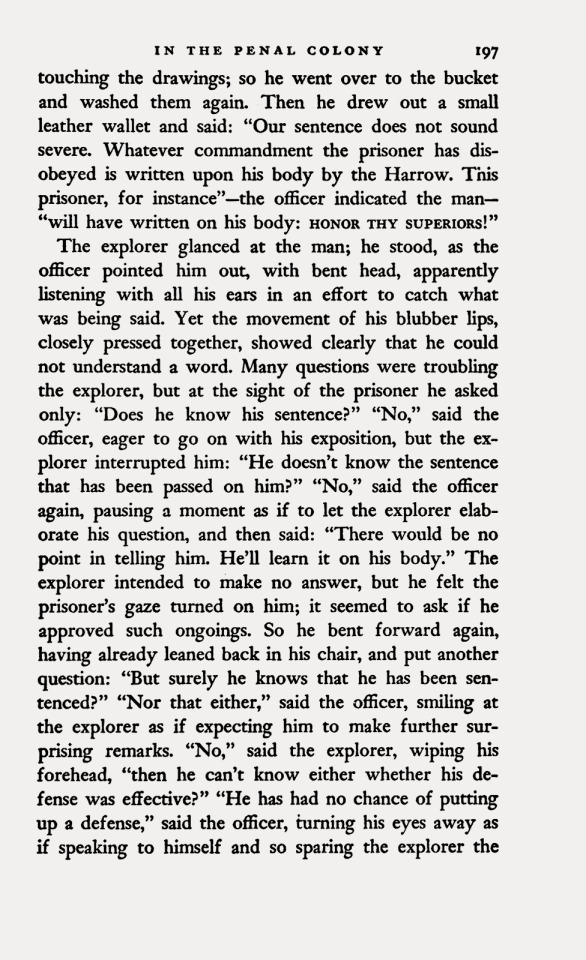
Franz Kafka, (1919), In the Penal Colony, in In the Penal Colony. Stories and Short Pieces, Translated by Willa and Edwin Muir, Schocken Books, New York, NY, 1948, p. 197
«[…] "Does he know his sentence?" "No," said the officer, eager to go on with his exposition, but the explorer interrupted him: "He doesn't know the sentence that has been passed on him?" "No," said the officer again, pausing a moment as if to let the explorer elaborate his question, and then said: "There would be no point in telling him. He'll learn it on his body."»
27 notes
·
View notes
Text
au where edwin survives
cause edwin, even though he was pretty violent, wasn't really wrong to feel the way he did. the show framed him as a villain when really, he was just someone whose life had been ruined by the magic ban. the show actually does this a lot - portraying sorcerers as the villains - which doesn't really make sense, considering the whole point is magic isn't evil.
if edwin survived, it would be an amazing chance for character development. edwin, who is well versed in magic (especially healing magic), could teach merlin how to control it better than gaius can, since gaius is rusty when it comes to magic. gaius, too, can try to be more proactive in protecting sorcerers - in a remedy to cure all ills, it is hinted that gaius learned his lesson, but his development is kinda halted when edwin dies (as edwin is declared 'the villain' rather than the morally grey character - or more accurately, human - he is).
also, edwin's character totally didn't want to take over camelot. i have no idea where that twist came from at the end of the episode. i think, most of the time, edwin was being completely genuine about his personality - he was just lying about why he was in camelot. edwin, overall, just wants to live in a world where his parents could have survived. merlin, although he's pretty bonkers, would be able to sympathize with this (i mean... he doesn't like the magic ban either). even if he didn't, merlin was young in that episode. he hadn't killed many people yet, and sure as hell wouldn't have done it without thinking, like he did in the show.
totally not self promo time: if you like the sound of this you should read the sixth chapter of the merlin rewrite, which is linked on my tumblr page.............................
#merlin#merlin emrys#merlin fandom#bbc merlin#arthur pendragon#merlin fanfic#merlin rewrite#merlin bbc#merlin headcanons#heacanons#edwin muir#camelot#character analysis#character development#episode analysis#down with canon
15 notes
·
View notes
Text
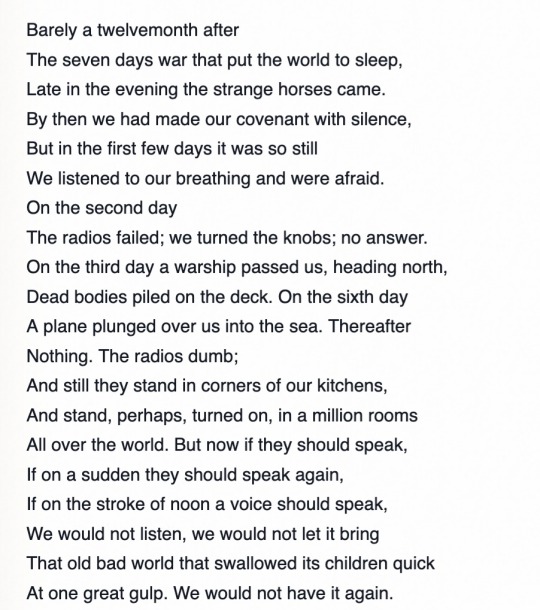

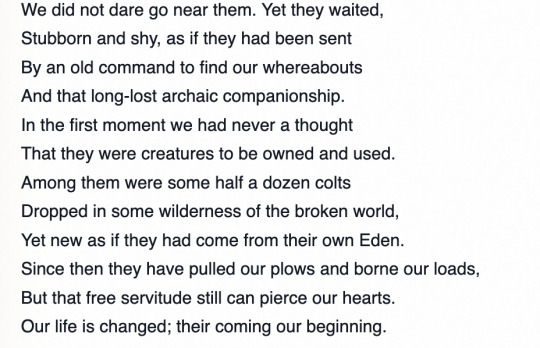
THE HORSES by edwin muir
13 notes
·
View notes
Text
To the Old Gods by Edwin Muir
Old gods and goddesses who have lived so long
Through time and never found eternity,
Fettered by wasting wood and hollowing hill,
You should have fled our ever-dying song,
The mound, the well, and the green trysting tree.
They have forgotten, yet you linger still,
Goddess of caverned breast and channeled brow,
And cheeks slow hollowed by millennial tears,
Forests of autumns fading in your eyes,
Eternity marvels at your counted years
And kingdoms lost in time, and wonders how
There could be thoughts so bountiful and wise
As yours beneath the ever-breaking bough,
And vast compassion curving like the skies.
8 notes
·
View notes
Photo
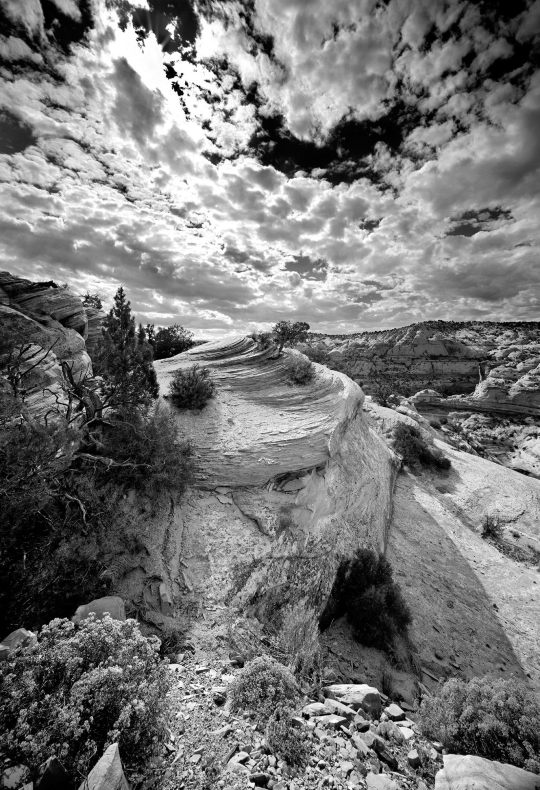
ESCALANTE RIVER CANYON 1 © 1997 | Utah | Learn more: https://bit.ly/38dO0G6
* * * *
The Wilderness Society, along with other groups, had been working on getting the Grand Staircase area of Escalante in Utah as a national monument when they sent me a request. In order for the congress to understand what the area looked like, the Wilderness Society asked me if I would take some photographs of the area for them to use to educate congress. I gladly said yes.
I captured this image in 1997 while spending time in the Grand Staircase area of Escalante. President Bill Clinton designated the area as a national monument in 1996 using his authority under the Antiquities Act. The Monument encompasses the largest land area of all U.S. National Monuments.
[Clyde Butcher Photography]
* * * *
“I think that if we examine our lives, we will find that most good has come to us from the few loyalties, and a few discoveries made many generations before we were born, which must always be made anew. These too may sometimes appear to come by chance, but in the infinite web of things and events chance must be something different from what we think it to be. To comprehend that is not given to us, and to think of it is to recognize a mystery, and to acknowledge the necessity of faith. As I look back on the part of the mystery which is my own life, muy own fable, what I am most aware of is that we receive more than we can ever give; we receive it from the past, on which we draw with every breath.”
-Edwin Muir: An Autobiography
Forward to Dakota by Kathleen Norris
#Clyde Butcher Photography#Escalante River Canyon#Utah#large format photography#The Wilderness Society#Grand Staircase#Dakota#Kathleen Norris#Edwin Muir#Autobiography#stories#time and space
18 notes
·
View notes
Text
Hermann Broch ~ Lettere alla traduttrice Willa Muir
Max Ernst, L’Ange du Foyer, 1937
Tragico è che questo male esiste realmente nell’ebraismo e che contro di esso si riesce ad infiammarsi sempre di nuovo, non certo per avversione al male, ma per legittimare la malvagità, cioè per poter meglio « punire » l’ebreo o depredarlo.
Hermann Broch
Lettere a Willa Muir (e Stephen Hudson)
Vienna, 1- Gonzagagasse 7
21 giugno…
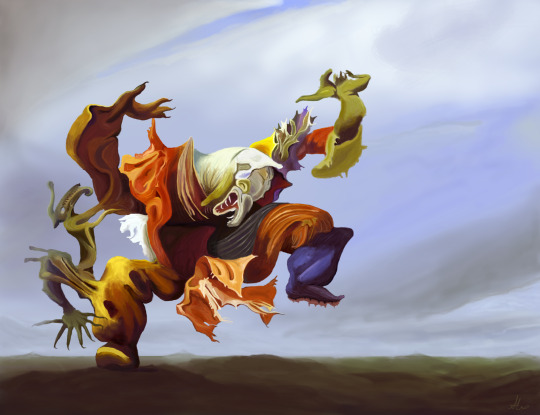
View On WordPress
0 notes
Text
The Castle
Edwin Muir
All through that summer at ease we lay,
And daily from the turret wall
We watched the mowers in the hay
And the enemy half a mile away
They seemed no threat to us at all.
For what, we thought, had we to fear
With our arms and provender, load on load,
Our towering battlements, tier on tier,
And friendly allies drawing near
On every leafy summer road.
Our gates were strong, our walls were thick,
So smooth and high, no man could win
A foothold there, no clever trick
Could take us, have us dead or quick.
Only a bird could have got in.
What could they offer us for bait?
Our captain was brave and we were true....
There was a little private gate,
A little wicked wicket gate.
The wizened warder let them through.
Oh then our maze of tunnelled stone
Grew thin and treacherous as air.
The cause was lost without a groan,
The famous citadel overthrown,
And all its secret galleries bare.
How can this shameful tale be told?
I will maintain until my death
We could do nothing, being sold;
Our only enemy was gold,
And we had no arms to fight it with.
#poetry#edwin muir#treachery#bribe#payment#collective#betrayal#enemy#greed#selfishness#strength#unity
0 notes
Text

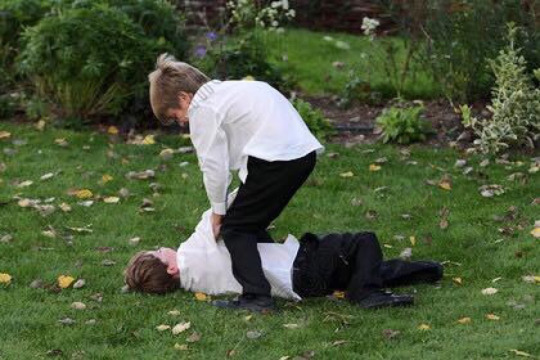

1 note
·
View note
Note
hey! i hope you're having a lovely day! i was wondering if you could do a weave on love compared to weather? like thunderstorms or sunshine etc. or just stormy weather as a joyful thing :)

Pema Chödrön

John Muir, ‘Mountain Thoughts’, published in John of the Mountains by Linnie Marsh Wolfe

Robert Frost, A Line-Storm Song

Sarah Kay & Phil Kaye, An Origin Story

Leigh Bardugo, Rule of Wolves

Sapardi Djoko Damono, ‘Aku Ingin/I Want’ from Before Dawn (trans. John H. McGlynn)

Clementine von Radics, Mouthful of Forevers

E. E. Cummings, i carry your heart with me

Alice Hoffman, Here On Earth

Edwin Morgan, Valentine Weather
#webs#web weaving#theme: weather#theme: love#mine#requests#i had these all in a google doc that i put together at work and still. STILL. it took me days#it simply did not want to go together#pema chödrön#john muir#robert frost#sarah kay#phil kaye#leigh bardugo#sapardi djoko damono#john h. mcglynn#clementine von radics#e. e. cummings#alice hoffman#edwin morgan#i am god's unfavourite because i only remembered after i did all the research for this i already had a love/storm web#so now u have two and i have as the kids say a headache
242 notes
·
View notes
Text









yes, yours my love, is the right human face.
i in my mind had waited this long,
seeing the false and searching for the true
-edwin muir
#aesthetic#moodboard#books and libraries#litblr#romantic academia#dark academia aesthetic#academia moodboard#chaotic academia#classic academia#poetry#girly things#dark moodboard#black and white#soft aesthetic#classical aesthetic#webcore#cybercore
51 notes
·
View notes
Text

Franz Kafka- Short Stories
Literature is the most extraordinary gift. It's timeless, precious, informative…
At least, it can be--
Once you figure out how to unwrap the damn thing!
Franz Kafka is a writer that I don't understand. Simply put. He uses language in a way that amazes my senses, curdles my brain, expands my heart, and threshes my ways of thinking. Still, I do not understand him. However, because of this, I do experience his writing most intensely. So, in a way, I feel like Franz Kafka is like a literary impressionist. Things aren't always clear upon first glance, but with patience, an open mind, and softer observations, they become more beautiful for being so.
Since it's my first time reading Kafka, I bought The Metamorphosis and Other Stories published by Schocken Books (translated by Willa and Edwin Muir). My favorite group of writings Kafka did are listed under the "Meditation" and "The Country Doctor" sections. I love how they are like glimpses into his mind and the world he perceives with it. There's one story in particular, "Children on a Country Road", that's about a group of boys running through the countryside that makes me feel so happy and nostalgic. I absolutely love it… but, again, I must confess, I had to read these stories multiple times to comprehend on a basic level what they were about. As was the case with the larger stories like "The Metamorphosis" and "In the Penal Colony", which were fascinating but emotionally and mentally challenging.
Working to understand something, digging tirelessly to unearth the root, is quite satisfying for me. I like the "click." That moment of understanding when all the details fall perfectly into place, and it feels as if the information takes on a deeper resonance. Reading Kafka has challenged this way of thinking.
Like a fox digging excitedly at the burrow while the rabbit watches from above… Now I see that sometimes the deeper you stoop to claw at an idea, the more room you make for it to leap over your head. We all think we're clever until we're walking home exhausted and unsatisfied.
So, look up. Look at things in their entirety, vague and frustrating as it is, and appreciate them when you can. Then say to yourself, contentedly and not resentfully, "I don't understand, but…"
It's beautiful anyway. It's important anyway. It's affecting anyway. It's lovely anyway. It's taught me something anyway.
So, what do I think of Kafka? I think he has broken my heart, tormented my mind, and kindled my soul. I think he's an extraordinary writer with a unique vision that is difficult to process. I think he had a lot to say as a young man, as a young writer, who didn't like how the world could be equal parts cruel and beautiful… and I think he didn't understand either: himself, his passion, or his impact. But, to say that indefinitely would be out of turn. So, I'll say this instead:
I think Franz Kafka is…
And I'll let that be that.
#literature#books & libraries#dark academia#romantic academia#light academia#aesthetic#books#words#classic academia#franz kafka#picture source: pinterest#the metamorphosis#personal#bookshelf#bookblr
22 notes
·
View notes
Text
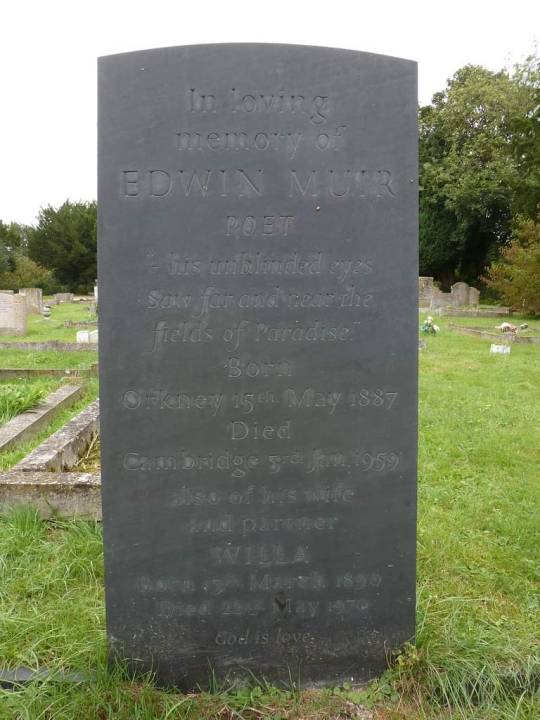
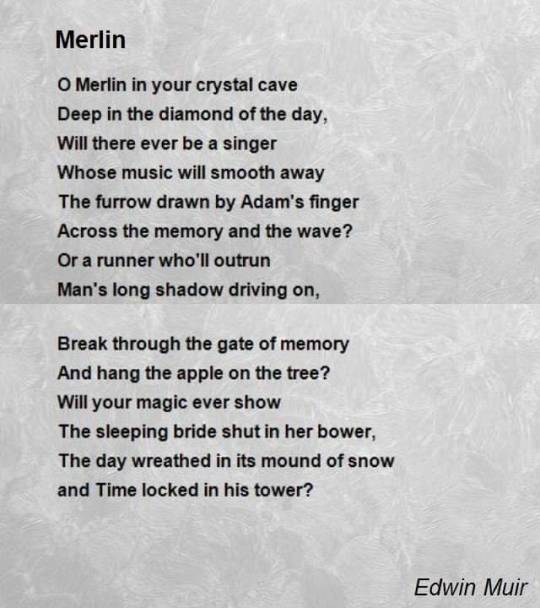
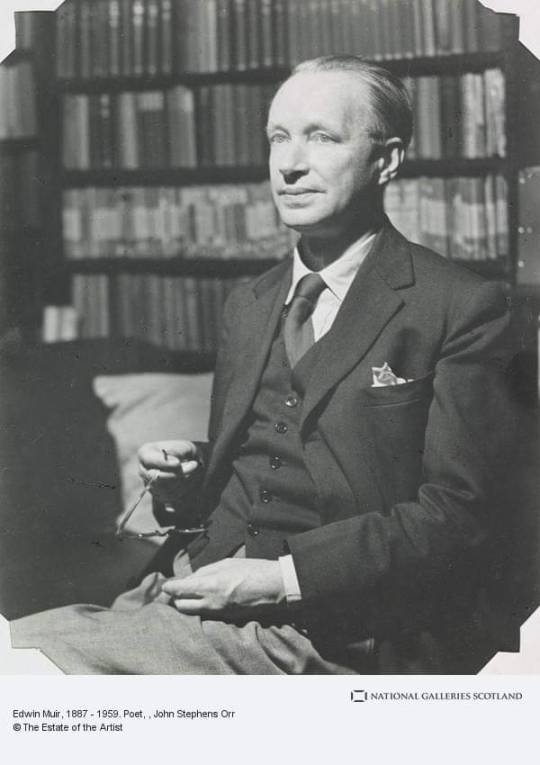
January 3rd 1959 saw the death of the poet and scholar Edwin Muir.
Born on the Orkney island of Wyre in 1887, Muir spent his early years in the idyllic setting of his father’s farm, ‘The Bu, when he was 14, his father lost his farm, and the family moved to Glasgow. In quick succession his father, two brothers, and his mother died within the space of a few years. His life as a young man was a depressing experience, and involved a raft of unpleasant jobs in factories and offices, including working in a factory that turned bones into charcoal. “He suffered psychologically in a most destructive way, although perhaps the poet of later years benefited from these experiences as much as from his Orkney 'Eden’.”
Termed a philosophical, political and social poet, Muir’s poetry attempts to find meaning and pattern in life, harmony & cooperation instead of competition and conflict; popular themes include a sense of timelessness, a sense of displacement and rootlessness and innocence. He travelled in Europe with his wife and fellow writer, Willa Muir, translating European writers such as Franz Kafka into English. The Muirs were significantly involved in the Scottish Literary Renaissance.
In 1955 he was made Norton Professor of English at Harvard University. He returned to Britain in 1956 but died in 1959 at Swaffham Prior, Cambridge, and was buried there.
A memorial bench was erected in 1962 to Muir in the idyllic village of Swanston, Edinburgh, where he spent time during the 1950s, there is also a Memorial to Edwin Muir in St Magnus Cathedral, Kirkwall, Orkney.
Scotland's Winter.
Now the ice lays its smooth claws on the sill,
The sun looks from the hill
Helmed in his winter casket,
And sweeps his arctic sword across the sky.
The water at the mill
Sounds more hoarse and dull.
The miller's daughter walking by
With frozen fingers soldered to her basket
Seems to be knocking
Upon a hundred leagues of floor
With her light heels, and mocking
Percy and Douglas dead,
And Bruce on his burial bed,
Where he lies white as may
With wars and leprosy,
And all the kings before
This land was kingless,
And all the singers before
This land was songless,
This land that with its dead and living waits the Judgement Day.
But they, the powerless dead,
Listening can hear no more
Than a hard tapping on the floor
A little overhead
Of common heels that do not know
Whence they come or where they go
And are content
With their poor frozen life and shallow banishment.
15 notes
·
View notes
Text
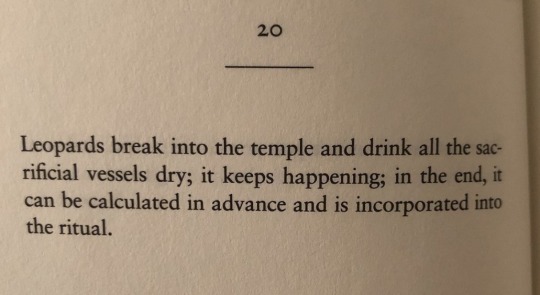
Franz Kafka: Aphorisms (The Zürau Aphorisms), which he wrote after being diagnosed with the illness that would kill him. Translated by Edwin and Willa Muir & Michael Hofmann, Schocken Books, 2015
6 notes
·
View notes
Text
Berna Moran gives Aşk-ı Memnu as a typical example of the “dramatic novel” as classified by Edwin Muir. Edwin Muir himself gives Wuthering Heights as an example of the “dramatic novel”. Needless to say I love dramatic novels.
Muir says about this type of novel:
“The reason for the isolation of the scene in the dramatic novel is obvious enough. Only in a completely shut-in arena can the conflicts which it portrays arise, develop, and end inevitably. All the exits are closed, and as we watch the action we know this. There is no escape into other scenes, or if there is we know that they are false exits bringing the protagonist back to the main stage again, where he must await his destiny. The scene here is the framework within which the logic of the action can develop unimpeded, and shut off from the arbitrary interference of the external world. It gives necessity to that logic by defining the limits within which it may work”.
And that’s why Heathcliff must return to Yorkshire, why Isabella running away to London ends her existence in the novel and why legal authorities will never interfere with Heathcliff’s schemes.
6 notes
·
View notes
Note
wait i think you'd like the poem 'The Labyrinth' by Edwin Muir if you havent come across it before? [available www.poetrynook.com/poem/labyrinth-0] the section "And then I'd stumble [...] centre of the endless maze." made me think of the Next NHL Saviour narrative....
OH I LOVE THIS!! THANK YOU FOR SENDING IT TO ME!!
I so agree.
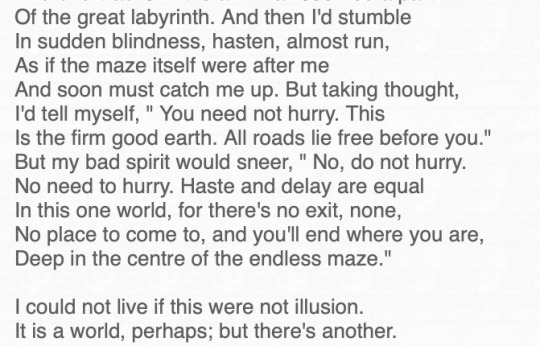
Connor McDavid coded. To me.
I love anything w ghosts or hauntings or whatever. This kinda reminds me of one of my all time favourite poems: The Listeners by Walter de La Mare.
#That was the real world; I have touched it once / And now shall know it always#love love love love#poetry rec
6 notes
·
View notes
Text
“Many questions were troubling the explorer, but at the sight of the prisoner he asked only: ‘Does he know his sentence?’ ‘No,’ said the officer, eager to go on with his exposition, but the explorer interrupted him: ‘He doesn’t know the sentence that has been passed on him?’ ‘No,’ said the officer again, pausing a moment as if to let the explorer elaborate his question, and then said: ‘There would be no point in telling him. He’ll learn it on his body.’”
— Kafka, “The Penal Colony”, trans. Willa Muir & Edwin Muir (1948)
14 notes
·
View notes